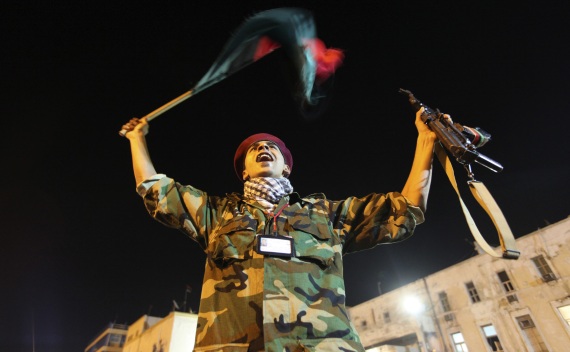You Might Have Missed: Libya Edition

--Joby Warrick and Scott Wilson, “U.S. Presses Libyan Rebels to Preserve Order,” Washington Post, August, 22, 2011.
“’This is precisely the way that we had been saying the strategy was suppose to work,’ said Ben Rhodes, the deputy national security adviser for strategic communications.”
--Senators John McCain and Lindsey Graham, "Graham and McCain on the End of Qadaffi Regime in Libya," joint statement, August 22, 2011.
“Americans can be proud of the role our country has played in helping to defeat Qaddafi, but we regret that this success was so long in coming due to the failure of the United States to employ the full weight of our airpower.” (3PA: A remarkable statement from Sen. Graham who in early April offered perhaps the best burden-sharing quote ever: “"When we call[ed] for a no-fly zone, we didn’t mean our planes.")
--David Owen, “We Have Proved in Libya that Intervention Can Still Work,” London Daily Telegraph, August 23, 2011.
“[Libyan rebels] success represents a vindication of the NATO strategy, and provides a template for the toppling of despots in Syria and elsewhere.”
“We have also set a precedent: that intervention can and does work.”
--Anne Applebaum, “Let Libya Take Charge of Its Revolution,” Washington Post, August 23, 2011.
“The Libyan revolution needn’t end in civil war. But there is no guarantee that it won’t.” (3PA: The situation in Libya from early March until last week was a “civil war.” As Stanford University political scientist, James Fearon wrote in 2006: “Civil war refers to a violent conflict between organized groups within a country that are fighting over control of the government, one side’s separatist goals, or some divisive government policy.” The Libyan civil war began on March 5, when the Benghazi-based Transitional National Council declared itself the legitimate power of the country, and called for the “the termination of the dictatorial regime.” Read here for the “Founding Statement of the Interim Transitional National Council (TNC).”)
--Stephen Fidler and Alistair MacDonald, “Europeans Retreat on Defense Spending,” Wall Street Journal, August 24, 2011.
"If you’re not able to deploy troops beyond your borders, then you can’t exert influence internationally, and then that gap will be filled by emerging powers that don’t necessarily share your values and thinking."
--U.S. Department of State, Patterns of Global Terrorism: 2010, Middle East and North Africa Overview, August 18, 2011.
“The Libyan government continued to demonstrate a strong and active commitment to combating terrorist organizations and violent extremism through bilateral and regional counterterrorism and security cooperation, particularly on the issue of foreign fighter flow to Iraq. Domestically, the Government of Libya has continued implementation of a counter-radicalization program focused on rehabilitating former Libyan Islamic Fighting Group (LIFG) leaders and members, as well as other Libyans formerly involved with extremist organizations. Regionally, Libya remained a counterterrorism ally and worked with neighboring countries to counter and respond to terrorist threats stemming from al-Qa’ida in the Islamic Maghreb (AQIM) and other extremist groups.” (3PA: With Qaddafi out of power, do you think Libya’s counterterrorism cooperation with the United States will be better, same, or worse?)
 Online Store
Online Store